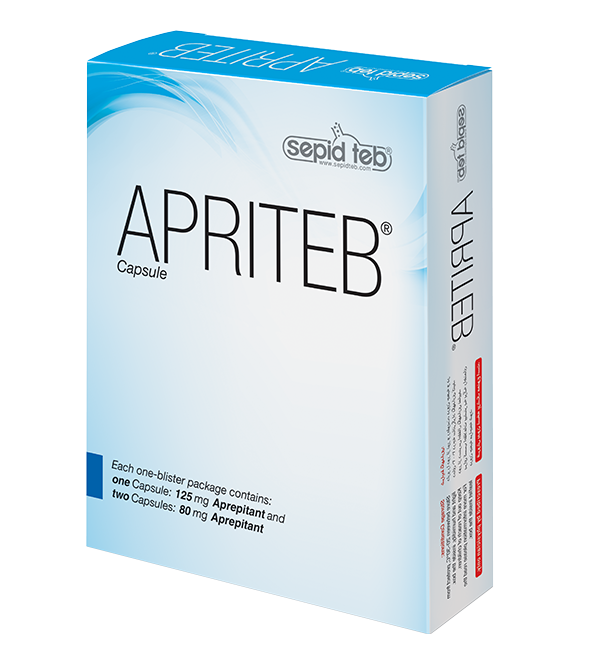Apriteb
Nausea and vomiting, cancer chemotherapy —induced (prophylaxis). Aprepitant, in combination with other antiemetic agents, is indicated for the prevention of acute and delayed nausea vomiting associated with initial and repeat courses of highly emetogenic cancer chemotherapy including high dose cisplatin .
Mechanism of action / effect:
Antiemetic: Aprepiant is a selective, high-affinity antagonist of human substance P/ neurokinin 1 (NK 1) receptors.
Pregnancy / Breastfeeding:
Pregnancy: FDA Pregnancy Category: B Since there are no adequate and well controlled studies in human, and animal studies are not always predictive of human response, aprepitant should only be administered during pregnancy if clearly needed.
Mechanism of action / effect:
Antiemetic: Aprepiant is a selective, high-affinity antagonist of human substance P/ neurokinin 1 (NK 1) receptors.
Pregnancy / Breastfeeding:
Pregnancy: FDA Pregnancy Category: B Since there are no adequate and well controlled studies in human, and animal studies are not always predictive of human response, aprepitant should only be administered during pregnancy if clearly needed.
Breast — feeding:
Aprepitant is not recommended for use while breast — feeding because of the potential for serious adverse effects in the nursing infant. Drug interactions and/or related problems: Note: Combinations containing any of the following medications, depending on the amount present, may also interact with this medication:
Astemizole, Cisapride, Pimozide, Terfenadine ,Benezodiaepines, such as Alperazolam or Midazolam or Triazolam, Carbamazepine ,Enzyme CYP3A4 inhibitors, Dexamethasone
Side/Adverse Effects:
Those indicating need for medical attention: Neutropenia, Angioedema, Bradycardia, Duodenal ulcer, perforating, Steven —Johnson syndrome, Urticaria.
Those indicating need for medical attention only if they continue or are bothersome: Anorexia (loss of appetite, weight loss); asthenia (lack or loss of strength): dehydration (confusion, decreased urination, dizziness, dry mouth, fainting, increase in heart rate, lightheadedness, rapid breathing, sunken eyes, thirst, unusual tiredness or weakness, wrinkled skin); diarrhea; dizziness; dyspepsia (acid or sour stomach; belching; heartburn; indigestion; stomach discomfort, upset, or pain), fatigue (unusual tiredness or weakness); heartburn; hiccups; nausea; stomatitis (swelling or inflammation of the mouth).
Incidence less frequent:
Abdominal pain (stomach pain) epigastric
discomfort (pain or discomfort in chest,
Dosage and Administration:
Dosage:
-Nausea and vomiting, cancer chemotherapy —induced (prophylaxis) Oral, 125 mg one hour prior to chemotherapy treatment (Day 1) and 80 mg once daily in the morning on Days 2 and 3.
-Aprepitant is given for three days as part of a regimen that includes ondansetron and dexamethasone given in combination. Administration:
-The importance of reading the package insert before starting therapy with aprepitant. -The importance of reporting the use of any prescription or non- prescription medicine or herbal products, because aprepitant may interact with some drugs including chemotherapy.
-Aprepitant is not recommended for chronic continuous use for the prevention of nausea and vomiting; safety and efficacy have not been established.
-Aprepitant should be taken only as prescribed.
-Taking with or without food.
Missed dose:
Taking as soon as possible; not taking if almost time for next scheduled dose; not doubling doses. Take with or without food.
Packaging and Storage:
Store between 20.c and 30.c.
Keep out of reach of children.
Avoid keeping and use of expired products.
APRITEB® capsules are available as
one Alu - Alu blister containing one
125 mg capsule and two 80 mg
capsules in a two — folded card board
box with a leaflet.
Licensed by Sepid teb nia
TEHRAN-IRAN
Please send any comments or suggestions about this product to:
P.O.Box: 19395 —1737
Email: customers@sepidteb.com

